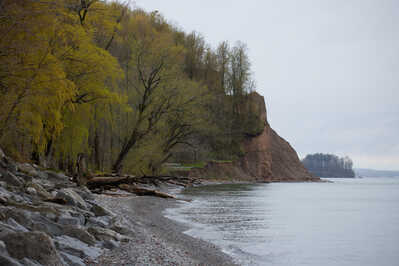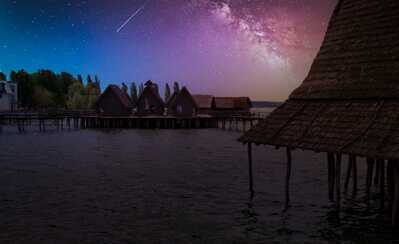Photography is an art form, subject to the photographer's interpretation. We have all these processing tools that keep getting better. Who's to say it's wrong to modify a dull sky? Not something I've done or been tempted to do but friends justify the enhancement by pointing out all the effort and time involved in getting that shot. And that it's easy to do. So far, if another angle or composition without the sky doesn't work and cropping doesn't either, I just hope for another chance on another day...while berating myself for not monitoring the hourly cloud cover forecast more closely.
So what does one do when you're at a place an hour and a half away these are the conditions:?
For me, this shot was about the shoreline and the spring greens in the willows...but what to do with that sky?
Come back another day? Isn't the point of photography to capture something reasonably similar to what you saw?
So what does one do when you're at a place an hour and a half away these are the conditions:?
For me, this shot was about the shoreline and the spring greens in the willows...but what to do with that sky?
Come back another day? Isn't the point of photography to capture something reasonably similar to what you saw?
I'm not sure that is always the intention when it is art. Maybe capture the experience? A feeling? Communicate something to the viewer? If it is my scene and my sky, perhaps taken on the same trip or at the same general location on another trip. I can't make you feel the breeze or see the grasses wave or smell the flowers, but perhaps can evoke some of the sense of the place in other ways.
Why don't we set our cameras on faithful and center all the Lightroom sliders and keep the curve linear? That would be closer to what is really there.
Come back another day?
When that's possible, sure. This was the first time I'd ever been to this spot and as I said it's about an hour and a half away, so it's not exactly in my neighborhood, where I can just pop over there whenever. I hope to get back there at some point, (and this time remember the drones...) but this is what I had to work with at that point in time.
Isn't the point of photography to capture something reasonably similar to what you saw?
My point - perhaps poorly stated - was that, for me, replacing the sky in this shot wouldn't be to "falsify" what I was trying to capture, but to remove a distraction - same as burning overly bright areas or cloning out powerlines. The trees and the shoreline are fine, but there's this huge gray negative space that keeps pulling your eye away from the subject.
My point - perhaps poorly stated - was that, for me, replacing the sky in this shot wouldn't be to "falsify" what I was trying to capture, but to remove a distraction - same as burning overly bright areas or cloning out powerlines. The trees and the shoreline are fine, but there's this huge gray negative space that keeps pulling your eye away from the subject.
I suggest using a less distracting sky, something like dark clouds but adjusted so that they are not as bright as your current sky, nor too dark to be distracting themselves. Something that would give the sky some texture or features without taking from the main subject. Tricky, I know, but you need to experiment and try different skies until you find one that works. Another solution would be to mask the sky and perhaps darken it or give a slight blue hue, something to make it slightly more interesting than gray.
@guydager
I believe that it's highly inappropriate to download another person's photo and edit it, then repost it, even when all you're trying to do is make a point. Respectfully, I believe you should just make your point and keep your sky replacements to yourself.
Yes, I suppose you're right. My apologies. As a teacher I sometimes can't help teaching.
If I clicked the right buttons I deleted the pics that were objected to. I don't know if this forum has a policy on editing and reposting other's work, but in general I'd say ask first unless the original poster requested it.
Yeah, that's pretty much how I use it, on the few occasions where I do. In the example given, if there were ANY shadow or textural detail in that sky, I would have just pulled that out and it would be fine - just as long as there's not this big, empty space!
I'm not putting Auroras or fake rainbows in, just minimizing distraction. 🤣
I have taken a lot of pictures "during the day" in Australian & NZ skies and they are bright and overexposed.I wouldn't consider replacing the sky (as I don't know how do that) but it is pleasing to lower exposure and highlights in Lightroom and get something near what I thought I saw at the time. the sky should be manipulated to what it is in the eye.
This debate has been going on with photographers for more than 130 years. Circa 1890 the mark of a good landscape photographer was that they had the skill to use two negatives, one with an interesting sky, to make a print.
This follows what has been taking place for centuries with landscape painters who would often paint an interesting sky and then use that for subsequent pastoral scenes or seascapes.
If someone lacks the skill or does not want to take the time to fix the sky then that is their decision and certainly not something I would consider commendable.
One of the first things I learned as a novice photographer back in 1965 with black and white film was the use of various filters to either intensify a cloudy sky or to reduce the light from foliage. This is something every B&W film photographer that shoots B&W outdoors has done.
@bo-gussname
That's a tough call because in addition to the sky, you have the reflection in the water. It is possible to blend the sky into the reflection, but it can also be very difficult.
In general, the results are going to be better when your original photo is composed and shot with the expectation that the sky will be replaced, and what kind of sky will be used. On the image shared, I don't know that it is compelling enough to take the photo with the expectation of sky replacement.
An out of the box solution is to replace the sky with a dramatic blue and cloud sky, and then do a conversion to B&W where the blue sky is rendered a mid to dark gray and the bright greens are boosted to be light and bright. You'll still have to deal with the reflections, but it might be easier.
Eric Bowles
www.bowlesimages.com

